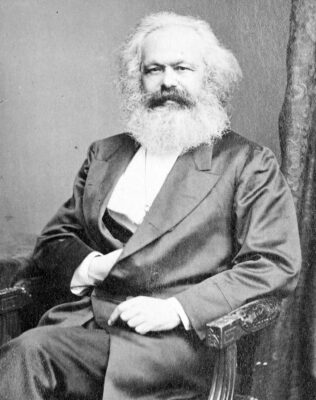 Darwin had a significant influence on Karl Marx (pictured left). Struggle and survival are central to Darwin’s theory of evolution. The full 1859 title of The Origin is – On the Origin of Species by Means of Natural Selection and the Survival of the Fittest in the Preservation of Favoured Races.
Darwin had a significant influence on Karl Marx (pictured left). Struggle and survival are central to Darwin’s theory of evolution. The full 1859 title of The Origin is – On the Origin of Species by Means of Natural Selection and the Survival of the Fittest in the Preservation of Favoured Races.
Darwin’s premise on survival and struggle in nature paralleled Karl Marx’s premise on social class struggle. Marx summarized the importance of “struggle” in the first line of chapter one of The Communist Manifesto, published in 1848 –
“The history of all hitherto existing society is the history of class struggles.”
Karl Heinrich Marx
Karl Heinrich Marx was born in Germany on May 5, 1818. In 1843, Marx moved to France, but French authorities ordered Marx to leave the country due to his participation in an assassination attempt on Frederick William IV, King of Prussia, in 1845.
After a time in Belgium and Prussia, Marx and his new comrade, Friedrich Engels (pictured right), finally settled in London, England, in 1849.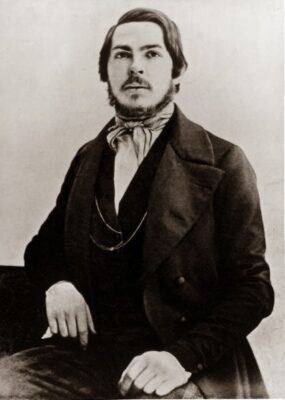
By the time Marx had moved to London in 1849, Darwin had already moved his young family from London to the town of Down seven years earlier. Even though Down is located just sixteen miles from London, ironically, they never met personally.
Marx and Engels capitalized on Darwin’s theory to develop a social construct. Within weeks of the publication of The Origin of Species in November 1859, Engels wrote to Marx –
“Darwin, by the way, whom I’m reading just now, is absolutely splendid. There was one aspect of teleology that had yet to be demolished, and that has now been done…. One does, of course, have to put up with the crude English method.”
Marx wrote back to Engels on December 19, 1860 –
“This is the book which contains the basis in natural history for our view.”
On The Origin of Species
The Origin of Species emerged as Marx’s pseudo-science justification for his emerging class struggle movement.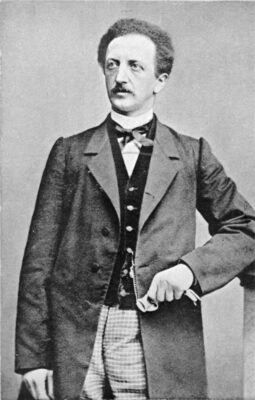 In a letter to comrade Ferdinand Lassalle (pictured left), on January 16, 1861, Marx wrote –
In a letter to comrade Ferdinand Lassalle (pictured left), on January 16, 1861, Marx wrote –
“Darwin’s book is very important and serves me as a basis in natural science for the class struggle in history.”
Marx inscribed “sincere admirer” in the first volume of Das Kapital he sent to Darwin in 1867. Darwin’s theory of natural selection played a crucial role in institutionalizing Communism. In Das Kapital, Marx wrote –
“Darwin has interested us in the history of Nature’s Technology, i.e., in the formation of the organs of plants and animals, which organs serve as instruments of production for sustaining life. Does not the history of the productive organs of man, of organs that are the material basis of all social organization, deserve equal attention?”
In Honor of Darwin
To acknowledge Darwin’s influence, Marx asked to dedicate Das Kapital (pictured right) in honor of Darwin. However, Darwin diplomatically replied in a letter to Marx – 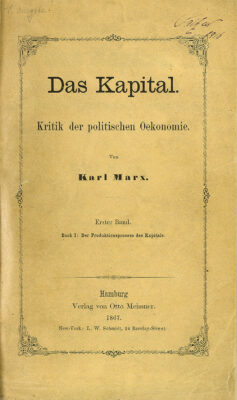
“Dear sir, I thank you for the honor that you have done me by sending me your great work on Capital, and I heartily wish that I was more worthy to receive it, but understanding more of the deep and important subject of political economy. Though our studies have been so different, I believe that we both earnestly desire the extension of knowledge and that this, in the long run, is sure to add to the happiness of Mankind. I remain, Dear Sir, Yours faithfully, Charles Darwin.”
At Karl Marx’s funeral in Highgate Cemetery in London, Engels spoke at Marx’s graveside on March 1883 –
“Just as Darwin discovered the law of evolution in organic nature, so Marx discovered the law of evolution in human history.”
Darwin launched a global dilemma.
Communism
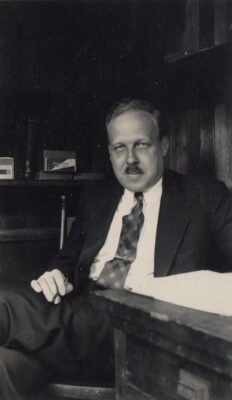 The American researcher Conway Zirkle (pictured left) explains why the founders of Communism immediately accepted Darwin’s theory –
The American researcher Conway Zirkle (pictured left) explains why the founders of Communism immediately accepted Darwin’s theory –
“Marx and Engels accepted evolution almost immediately after Darwin published The Origin of Species. Evolution, of course, was just what the founders of Communism needed to explain how Mankind could have come into being without the intervention of any supernatural force, and consequently, it could be used to bolster the foundations of their materialistic philosophy.”
Genesis
Marx re-interpreted Darwin’s theory to be the scientific foundation for developing the most devastating social movement in the history of Mankind. Once a Biblical advocate at Cambridge University, Darwin became blinded and rejected the biblical account – including the Genesis account. As he explains in his Autobiography –
“Thus disbelief crept over me at a very slow rate, but at least it was complete. The rate was so slow that I felt no distress and have never since doubted even for a single second that my conclusion was correct. I can hardly see how anyone ought to wish Christianity to be true, for if so, the plain language of the text seems to show that the men who do not believe, and this would include my Father, Brother, and almost all my best friends, will be everlasting punishment. This is a damnable doctrine.”
Nicholas Copernicus, the Renaissance mathematician, astronomer and principle of the Scientific Revolution, by contrast, reveled in the biblical account –
“To know the mighty works of God, to comprehend His wisdom and majesty and power; to appreciate, in degree, the wonderful workings of His laws, surely all this must be a pleasing and acceptable mode of worship to the Most High, to whom ignorance cannot be more grateful than knowledge.”
Charles Darwin’s biography underscores why his theory of evolution remains speculative but not scientifically valid.
Darwin on Marx is a Biographical Sketch of Charles Darwin article.
Darwin Then and Now is an educational resource on the intersection of evolution and science, highlighting the ongoing challenges to the theory of evolution.
Move On
Explore how to understand twenty-first-century concepts of evolution further using the following links –
-
- The Understanding Evolution category showcases how varying historical study approaches to evolution have led to varying conclusions. Subcategories include –
- Studying Evolution explains how key evolution terms and concepts have changed since the 1958 publication of The Origin of Species.
- What is Science explains Charles Darwin’s approach to science and how modern science approaches can be applied for different investigative purposes.
- Evolution and Science feature study articles on how scientific evidence influences the current understanding of evolution.
- Theory and Consensus feature articles on the historical timelines of the theory and Natural Selection.
- The Biography of Charles Darwin category showcases relevant aspects of his life.
- The Glossary defines terms used in studying the theory of biological evolution.
- The Understanding Evolution category showcases how varying historical study approaches to evolution have led to varying conclusions. Subcategories include –


